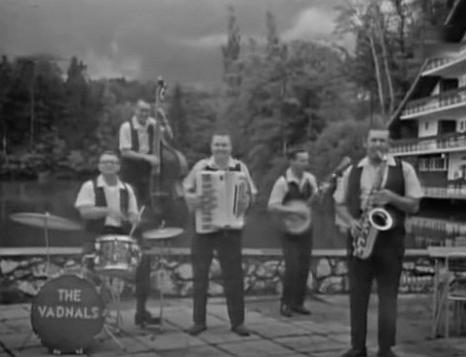
Polka has long been the traditional music of Slovenia’s Alpine valleys and villages. As thousands of Slovenians immigrated to the United States, new approaches and influences from other cultures helped to reinvent the age-old musical form and make it refreshingly modern. One group, based in Cleveland, Ohio, played a key role in that transformation and became immensely popular on both sides of the Atlantic.
In the 1930s, four members of the Slovenian-American Vadnal family – brothers Frank, Tony, Johnny and sister Valeria – formed a group known simply as the Vadnals. They were later joined by Ritchie, the youngest member of the family, as well as Frank Mahnic and Bill Srnick. The Vadnals grew up in the tightly-knit, polka-playing Slovenian community in Cleveland, where they had learned to play old Slovenian tunes at an early age. They soon began performing at Slovenian-American venues across the United States.
It soon became apparent that the Vadnals were not just another polka band. They were determined to reinvent the genre by combining traditional Slovenian music with various American influences and instruments. They introduced the banjo and eventually the electric guitar to Slovenian polka, making it modern, cool, and popular with wide audience.
Because of the Vadnals’ crossover appeal, they made regular appearances on the popular Mutual radio network. Throughout the 1950s, they also hosted a weekly television program on WEWS-TV in Cleveland, the first regularly scheduled polka TV show in the United States, and toured the country with Frankie Yankovic, America’s Polka King.
The Vadnals also brought their innovative style of polka to the Old Country, appearing on then-brand-new Slovenian television. Audiences fell in love with their modernized style of polka, which represented an intriguing blend of American and Slovenian influences and was unlike anything previously heard on the country’s airwaves. Some songs, such as the supremely catchy “No Pivo [Beer] Today,” became legendary in Slovenia. (In this case, even the bilingual title encapsulated the uniquely trans-Atlantic blend perfected by the Vadnals.)
Following their success in Slovenia, the Vandnals toured other Alpine countries and even Mexico throughout the 1960s and ‘70s, and were eventually inducted into the Cleveland Polka Hall of Fame for their contribution to the musical genre. Despite their advancing years, they continued to perform into the 1980s. The Vadnals’ longtime bandleader Johnny Vadnal died in 2008 at the age of 84.
Throughout their career, the Vadnals helped to establish the Slovenian-inspired Cleveland style of polka as an equal to other varieties of polka music in the U.S., such as the well-known Polish variety from Chicago. And as younger generations of Slovenian-Americans resettled across the country, polka music tended to remain a potent cultural bond, uniting not just people of Slovenian descent with each other, but also the Slovenian community with the Old Country - and their heritage.

































































